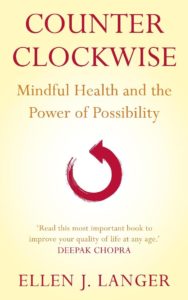by Julie Randolph, Care Coordinator
 While participating in a course called, “Flourishing in the Third Third of Life,” I learned of the book entitled Counter Clockwise by Ellen J Langer. The foundation is a 1979 Harvard psychological study in which a group of men ages 70 to 80 attended a week-long retreat. The psychologists re-created an environment in which everything the attendees saw, touched, smelled, and experienced was as it was in 1959.
While participating in a course called, “Flourishing in the Third Third of Life,” I learned of the book entitled Counter Clockwise by Ellen J Langer. The foundation is a 1979 Harvard psychological study in which a group of men ages 70 to 80 attended a week-long retreat. The psychologists re-created an environment in which everything the attendees saw, touched, smelled, and experienced was as it was in 1959.
The “counterclockwise study” looked at the effects of turning the clock back 20 years psychologically on the participant’s physiological state. The results were measurable improvements in their physical strength, manual dexterity, gait, posture, perception, memory, cognition, taste sensitivity, hearing and vision.
The author focuses on mindful health and urges the reader to examine tendencies to accept information without question. Langer describes modern medicine’s practice of fitting patients into established medical formulas and provides an alternative finding that suggests patients introduced to an individualized medical approach that fits their unique medical needs experience better outcomes.
Langer challenges the belief that our bodies are separate from our minds by providing evidence that our beliefs are crucial to our well-being. The research indicates that the greatest factor in determining quality of life is how people think about the relationship between their identity and their illness. Words used, uniforms worn, roles played, stereotyping, labeling, blind trust in medical technology and absolute medical provider accuracy support a passive acceptance. Active mindfulness and critical thinking are a patient’s greatest allies for positive health outcomes.
As we age and face health changes, we can become health learners, critical thinkers and advocates for our individual medical or non-medical options. Langer states that “while the medical professionals are the best experts on the general course an illness may take, we are the best experts on our particular journey.”
Lastly, studies show “that ‘over helping’ can lead individuals to infer their own helplessness and incompetence, causing them to do poorly at a task that they had previously been able to accomplish.” The findings reinforce the reasoning behind offering active learning opportunities and robust fitness choices. Providing assistance only when it is truly needed supports the dignity and continued accomplishments of each person.
It is the hope and goal of the Care Coordinators to promote continuous growth, to support the most independent living possible, and to do our part to celebrate the positivity of growing through our ages.

